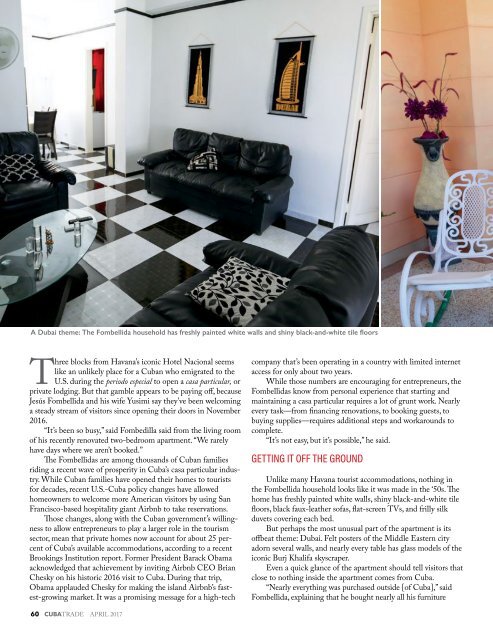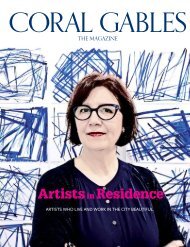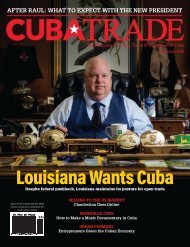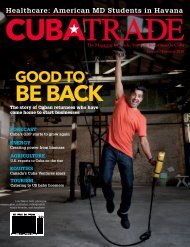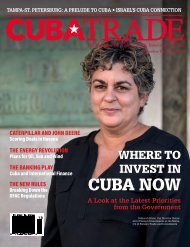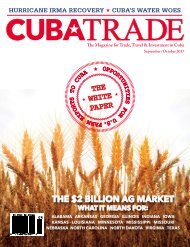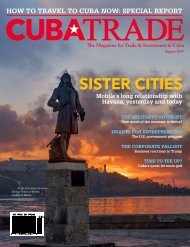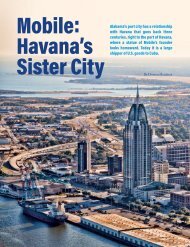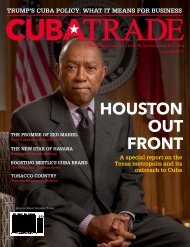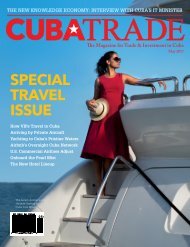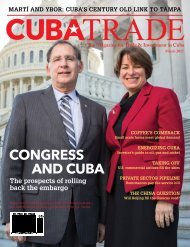CubaTrade-April2017-FLIPBOOK
You also want an ePaper? Increase the reach of your titles
YUMPU automatically turns print PDFs into web optimized ePapers that Google loves.
A Dubai theme: The Fombellida household has freshly painted white walls and shiny black-and-white tile floors<br />
Left: Angel Pupo Rosa and his wife Maria Mercedes Oliveros at their home near Vedado. Right: An adjacent home under construction.<br />
Three blocks from Havana’s iconic Hotel Nacional seems<br />
like an unlikely place for a Cuban who emigrated to the<br />
U.S. during the periodo especial to open a casa particular, or<br />
private lodging. But that gamble appears to be paying off, because<br />
Jesús Fombellida and his wife Yusimi say they’ve been welcoming<br />
a steady stream of visitors since opening their doors in November<br />
2016.<br />
“It’s been so busy,” said Fombedilla said from the living room<br />
of his recently renovated two-bedroom apartment. “We rarely<br />
have days where we aren’t booked.”<br />
The Fombellidas are among thousands of Cuban families<br />
riding a recent wave of prosperity in Cuba’s casa particular industry.<br />
While Cuban families have opened their homes to tourists<br />
for decades, recent U.S.-Cuba policy changes have allowed<br />
homeowners to welcome more American visitors by using San<br />
Francisco-based hospitality giant Airbnb to take reservations.<br />
Those changes, along with the Cuban government’s willingness<br />
to allow entrepreneurs to play a larger role in the tourism<br />
sector, mean that private homes now account for about 25 percent<br />
of Cuba’s available accommodations, according to a recent<br />
Brookings Institution report. Former President Barack Obama<br />
acknowledged that achievement by inviting Airbnb CEO Brian<br />
Chesky on his historic 2016 visit to Cuba. During that trip,<br />
Obama applauded Chesky for making the island Airbnb’s fastest-growing<br />
market. It was a promising message for a high-tech<br />
company that’s been operating in a country with limited internet<br />
access for only about two years.<br />
While those numbers are encouraging for entrepreneurs, the<br />
Fombellidas know from personal experience that starting and<br />
maintaining a casa particular requires a lot of grunt work. Nearly<br />
every task—from financing renovations, to booking guests, to<br />
buying supplies—requires additional steps and workarounds to<br />
complete.<br />
“It’s not easy, but it’s possible,” he said.<br />
GETTING IT OFF THE GROUND<br />
Unlike many Havana tourist accommodations, nothing in<br />
the Fombellida household looks like it was made in the ‘50s. The<br />
home has freshly painted white walls, shiny black-and-white tile<br />
floors, black faux-leather sofas, flat-screen TVs, and frilly silk<br />
duvets covering each bed.<br />
But perhaps the most unusual part of the apartment is its<br />
offbeat theme: Dubai. Felt posters of the Middle Eastern city<br />
adorn several walls, and nearly every table has glass models of the<br />
iconic Burj Khalifa skyscraper.<br />
Even a quick glance of the apartment should tell visitors that<br />
close to nothing inside the apartment comes from Cuba.<br />
“Nearly everything was purchased outside [of Cuba],” said<br />
Fombellida, explaining that he bought nearly all his furniture<br />
and appliances in Panama’s Colón Free Trade Zone and had it<br />
all shipped to the island. As for the Dubai souvenirs, he says his<br />
son brought them back from his frequent travels there. “I myself<br />
have never been to Dubai,” he said with a chuckle, while wearing<br />
a Dubai hat.<br />
It’s difficult to find good quality materials<br />
and products here. You need to find products<br />
in Panama and Mexico<br />
Angel Pupo Rosa<br />
Buying and shipping products from Panama is prohibitively<br />
expensive for most Cubans, but Fombellida is no ordinary Cuban.<br />
He left the island on a balsa for the United States in 1994 to<br />
escape the economic crash that followed the Soviet Union’s collapse.<br />
He eventually made his way to New York, where he earned<br />
a living as an apartment building manager. During his time in the<br />
U.S., he kept in close contact with friends and family back home,<br />
and made frequent visits to the island. Maintaining those ties<br />
allowed Fombellida to fall in love with his wife Yusimi.<br />
Several years ago, Fombellida permanently returned to the island,<br />
begging the question of why somebody would leave the comforts<br />
of the United States to go back there. “To be with his wife, of<br />
course,” said Yusimi Fombellida, answering the question herself.<br />
While the Fombellidas are fortunate enough to be able<br />
to use American-earned dollars to spruce up a casa particular,<br />
many Cubans look elsewhere to finance home construction and<br />
remodeling projects.<br />
Retired engineer Angel Pupo Rosa and his wife Maria<br />
Mercedes Oliveros—friends of the Fombellidas—asked their<br />
daughter in Italy to help pay for renovations to their casa particular.<br />
A quick look at their five-room colonial-style home makes it<br />
clear that it wasn’t cheap.<br />
After learning that the second floor of the building where<br />
they lived was crumbling, Rosa and Oliveros bought and renovated<br />
the entire second floor. This involved doing some construction,<br />
remodeling all the bathrooms, painting walls, modernizing amenities<br />
and buying furnishings. Rosa says the entire project cost<br />
about CUC 50,000—roughly US$58,000. A considerable portion<br />
of that money came from his daughter through wire transfers or<br />
in-hand deliveries.<br />
“It’s difficult to find good quality materials and products here,”<br />
said Rosa. “You need to find products in Panama and Mexico.”<br />
The result of their investment is a casa particular that offers<br />
guests a taste of what upper-class homes in Cuba were like before<br />
the Revolution—an ambience found at historic hotels such as the<br />
Saratoga and Nacional for a much steeper price.<br />
“It has a balance of modern and classic,” Rosa said.<br />
60 CUBATRADE APRIL 2017<br />
APRIL 2017 CUBATRADE<br />
61


